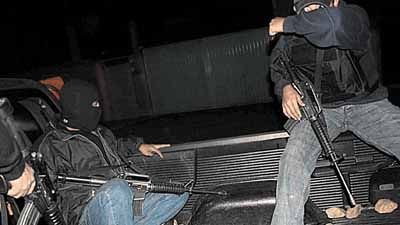The Politics of Violence in Oaxaca
Recent Government Actions Lead to Fears of Generalized Violence Against the People
Without doubt, violence always merits condemnation. It deserves it more when it comes from those who should guarantee harmony and peaceful coexistence – the governments – and most of all when it is used to legitimize the exercise of a power that could not be legitimized by other means. But whatever its origins, we should always do our utmost to not only reprove violence, but to prevent its occurrence.
 Gunmen sent to attack the APPO on August 22 Photo: José Alberto Cruz |
Hard times lie in store: That seems to be the message of the mobilization of the army in strategic points of the country; the creation of military units specially trained to deal with social protests and detain their leaders; the state of siege in a part of the capital during Vicente Fox’s last presidential report; the assassination of members of the police by drug-traffickers and a general increase in criminal activity; and finally the deliberate lack of attention to national problems that range from growing poverty to the loss of employment opportunities and increasing levels of migration.
Parallel to the electoral fraud on the federal level, the state of Oaxaca is experiencing a growth of aggression against those Oaxacans who, tired of the tyranny of state governor Ulises Ruiz Ortis, have organized themselves into the Popular Assembly of the Peoples of Oaxaca (APPO). That aggression is carried out by paramilitary groups who consist of common criminals, illegally taken from the prisons for that purpose, as well as members of the police force.
The conflict didn’t begin with the government’s attempt of June 14 to remove the striking teachers of 22nd section of the teachers’ union SNTE-CNTE from the central square of the city of Oaxaca where they were protesting, but it was brought to a head by it. Its historical antecedents go back as far as the tradition of resistance of the indigenous communities. In the more recent past, it follows the expulsion from the central square of the Union of State Service Workers on June 12, 2003, and of protesters from the Popular Indigenous Council of Oaxaca “Ricardo Flores Magón” (CIPO) on September 14 and again on December 23 2004; the imposition of a state governor (Ulises Ruiz) in a contested election process; and the aggression against various other organizations of civil society, who all have their share of members that are held as political prisoners or, in the case of the author of this article, were forced into political exile.
But the formation of the APPO and its attempts at creating autonomous institutions through non-violent direct action go, without doubt, much beyond the partisan demands of some social organizations and unions. And against the peaceful efforts of the APPO to form citizen councils, take over radio stations, form voluntary self-defense groups, put up alternative markets, occupy buildings in order to restore them and put them at the service of the community, and put up barricades in order to stop the police form committing further aggression, the government responds with a dirty war designed to generate terror and discourage the participation of the population. Its aim is to isolate nuclei of organization in order to stop the movement by means of chirurgical repression.
The announcements of the state government concerning the social movement fit into its general strategy of a dirty war: in spite of the fact that all the killed and the wounded in this conflict are on the side of the APPO, that members of the movement, in contrast to those of the paramilitary forces, do not mask their faces, and that all of their actions – from demonstrations by children with flowers, to processions which celebrate Christian church services, to songs and dances – do not overstep the limits of the law and the constitution, the government maintains that it is the APPO who acts as an urban guerrilla force. In fact, an explosion of violence has so far been prevented only by the calm attitude of the APPO, which after its last mass-march of protest has begun to unilaterally take steps to diffuse the tension.
At the same time, authorities have elegantly described their paramilitary operations as “road cleaning operations,” although everybody else in Oaxaca has been forced by events to speak of the paramilitaries as the “convoy of death.” Those events include the armed invasion of radio and TV stations and of the office of the newspaper Noticias, the beating up of journalists, the damage done to shops, and the creation of general terror through the assassination of Jose Colmenares, Lorenzo San Pablo Cervantes and Gonzalo Cisnero Gautier, as well as assassination attempts against other persons and assassination threats against many more, including Refugio Gregorio Bautista “Dona Vicky,” who had visited Vancouver during the World Peace Forum only shortly before.
We call on all Canadians and Mexicans who live in Canada not to ignore these alarming developments in Mexico, but to show their indignation in the face of the repression of civil society in Oaxaca.
CIPO-Van is an organization that promotes solidarity with the struggle of the Consejo Indigena Popular de Oaxaca (CIPO) against state violence and for autonomous community development. If you have questions about us or want to come to our weekly meetings, contact Raul Gatica at 778-862-6955 (only Spanish) or Gil Aguilar at 604-537-8909 (English and Spanish).


0 Comments:
Post a Comment
Subscribe to Post Comments [Atom]
<< Home